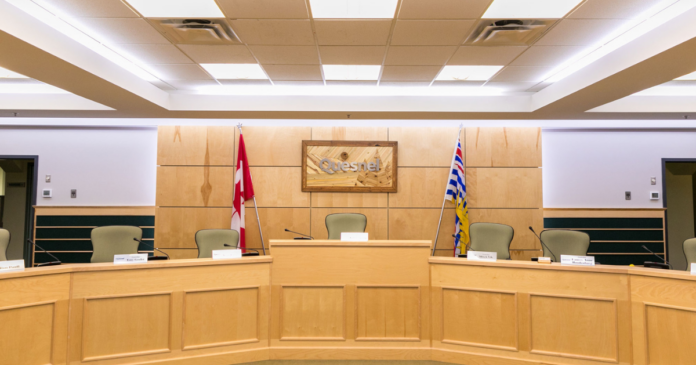Quesnel, Quesnel, Quesnel! My goodness, what in the world are your city councillors smoking?
Whatever it is, we fully encourage them to continue doing so because their ongoing grotesque displays of illiberalism, sexism, racism, genuflection to hurt indigenous feelings, and general undemocratic buffoonery masquerading as reconciliation are attracting a ton of attention to the wildly successful best-selling book, Grave Error: How the Media Misled Us (and the Truth About Residential Schools), to which we are both contributors.
The latest developments in the Quesnel, B.C. debacle are based on accusations Mayor Ron Paull promoted Grave Error at a Cariboo Regional District board meeting where he was representing the city around the same time his wife, Pat Morton, was distributing free copies in Quesnel, an act of distributing “hate literature,” according to her critics.
At the Apr. 30 city council meeting, the mayor was formally censured, his travel and lobbying budget cancelled, his membership in organizations that require council approval stripped, and his membership on all city council committees revoked.
In short, council members, only one of whom admitted he had read Grave Error, punished him as much as they legally could, hoping this would lead to his resignation as mayor, something they have been calling for since early April.
Blaming Paull from the beginning for the actions of his wife, Pat Morton, is an appalling example of sexism. The mayor did not control his wife’s behaviour, so this city council, acting solely out of politically correct self-righteousness, discarded the standard conventions of a liberal democracy, including respect for free speech, in a fruitless effort to achieve chimerical reconciliation based on hurt Indigenous feelings.
Grave Error, the name given to the collection edited by C.P. Champion and Tom Flanagan, was written to debunk the outrageously false claims of a clandestine mass grave of murdered Indigenous children at the former Indian Residential School in Kamloops, B.C.
That canard led to a rush of other “copycat” claims of unmarked graves, consisting of subsoil disturbances at former residential schools revealed by the inconclusive technique called ground penetrating radar.
Given that the unmarked graves have often been said to contain the remains of murder victims, this rush to search for missing children no family members had reported as missing omitted a critical feature: no official police agency, such as the RCMP, was brought in to investigate. Instead, the “investigation” was handed over to those who would, if the claims were verified, be exploring crimes perpetrated against their very own people, a repudiation of the elementary canons of impartial Western justice.
Our ancestors who built this country and constructed and ran the residential schools were surely as flawed as any previous or subsequent generation, Indigenous or otherwise. But they were also incredibly courageous, decent, innovative, adventurous, and hard-working. This is evident in the country and society they built and left to us. It is not just the roads, schools, power stations, factories, museums, and hospitals they built, but the laws, customs, and conventions that we took up and enhanced after they passed on. These features show that Canada has been a model civilization since its inception.
And no other country in the world – not America, not Mexico, not China, not Australia – has treated its Indigenous people with more benevolence. Not one.
Still the Quesnel shenanigans show the downside of such benevolence. What was long a peaceful and fruitful encounter between very different cultures has seen reconciliation efforts killed by the milk of human kindness in recent decades.
What this revealed, once again, is that a quest for reconciliation with Indigenous people is always a one-way, dead-end street where traditional standards of truth-telling and tolerance for different opinions are withheld from those who would dare question unverified indigenous “knowings” promulgated by anonymous and infallible indigenous “knowledge keepers.”
To be sure, it would be equally false to claim that no abuse occurred at the Indian Residential Schools or defend the proven abuses that did take place.
None of this is done by the authors of Grave Error.
Instead, research into these issues suggests the tragic failure of Indigenous integration into modern civilization has three contradictory levels. The first level is historical circumstances. The pre-industrial, pre-literate, mainly hunting-and-gathering lifeways and associated beliefs and values of Canada’s indigenous people were the most significant challenge and remain the biggest roadblock preventing the flourishing of contemporary Indigenous communities.
The second level deals with personal responsibility. Too many Indigenous Canadians continue to be convinced that they have little personal agency because they are the everlasting victims of settler colonialism, hence not responsible for their present condition or the bad choices perpetuating their differential adversities and pathologies.
The third level, and the one with the least salience, is the sphere where Canada’s white Christian ancestors can be blamed for errors they made or wrongs they committed. Where there is plausible evidence, not myth, hearsay, or junk social science, blame for Indigenous adversity in the past and present must be acknowledged and remedied.
Still, our ancestors must be remembered for both their virtues and vices. So should their living descendants. After all, the living and dead share a common feature: the imperfection of the human condition.
It should be apparent that an obsession with hurt Indigenous feelings will never achieve the truth about anything. If this view keeps being rejected, it means that reconciliation with Indigenous people will always require condemning books no one has read and accepting assertions that are known to be false, something freedom-loving people must not tolerate.
James Pew is an independent writer and researcher, and the editor of Woke Watch Canada.
Hymie Rubenstein is editor of REAL Indigenous Report and a retired professor of anthropology, the University of Manitoba.















